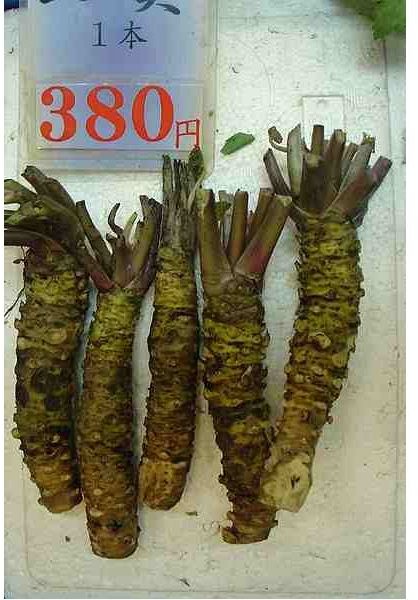The Amazing Health Benefits of Wasabi
Wasabi, a popular Japanese vegetable of the Brassicaceae family, includes cabbages, mustard, and horseradish. Although there are different types of wasabi, the main cultivar is Wasabia japonica. The root of wasabi is grated or ground to make wasabi paste, used as sauce for a variety of Japanese foods such as sushi and sashimi. Besides the root, wasabi leaves are also edible. Wasabi is cultivated in Japan, China, Taiwan, Korea, and New Zealand.
Wasabi is world famous for its extremely strong spicy flavor. Unlike chili peppers, the sensation that wasabi gives is felt primarily in the nasal passages and can be pretty painful, although the burning sensation lasts for only few seconds.
Wasabi is not only hot in the mouth but also hot in health benefits. There are many health benefits of wasabi: anticancer, antimicrobial, anti-inflammatory, anti-heart attack, and anti-stroke.
Anticancer Properties
Wasabi, like many cruciferous vegetables, contain isothiocyanates which are formed during the enzymatic breakdown of glucosinolates. When wasabi root is macerated, glucosinolates are released from cells and then react with hydrolytic enzymes to form isothiocyanates. Many studies show positive association between isothiocyanate exposure (ingestion) and lower risk of cancer.
Wasabi isothiocyanate extract has been proven effective in laboratory tests against breast cancer, leukemia, lung cancer, stomach cancer, esophageal cancer, colon cancer, and prostate cancer.
Inside the body, isothiocyanates enhance the activity of biotransformation enzymes. These enzymes play significant roles in the metabolism and elimination of carcinogens, drugs, chemicals, and toxins.
Antimicrobial Properties
The isothiocyanates found in wasabi have bactericidal properties. In laboratory studies, isothiocyanates have been found to kill pathogenic bacteria such as Streptococcus mutans and Helicobacter pylori. S. mutans is the bacterium that causes tooth decay. H. pylori is the bacterium associated with increased risk of gastric cancer. Test tube studies show that extracted isothiocynates from wasabi roots and leaves killed and inhibited the growth of multiple strains of H. pylori even the antibiotic-resistant strains. Wasabi extract has also been found to kill several bacterial strains that cause food poisoning. Interestingly, there are now few brands of wasabi-based antibacterial hand washes.
Prevention of Heart Attack and Stroke
Isothiocyanates extracts from wasabi have blood-thinning or anticoagulation properties. Blood thinners disrupt the physical aggregation of platelets. Blood clot (aggregated platelets) can act as embolus or a mass that becomes lodged in a blood vessel and obstructs it. An embolus is the primary requirement for the occurrence of heart attack and stroke in humans. Consumption of foods that contain high amount of isothiocyanates like wasabi can help decrease the risk of getting heart attack and stroke.
Anti-Inflammatory Properties
Another health benefit of wasabi is the ability to inhibit inflammation. Isothiocyanate extract from wasabi has been found to block cyclooxygenase-2 (COX2), an enzyme responsible for inflammation and pain. Consuming wasabi may help relieve the symptoms of inflammatory diseases such as rheumatoid arthritis and Crohn’s disease.
References
- Sin, I.S. et al., 2004. Bactericidal activity of wasabi (Wasabia japonica) against Helicobacter pylori. International Journal of Food Microbiology
- Isothiocyanates. Micronutrient Information Center. Linus Pauling Institute, Oregon State University.
- Morimitsu, Y. et al. 2000. Antiplatelet and anticancer isothiocyanates in Japanese domestic horseradish, wasabi. Biofactors.
- Nomura, T. et al. 2005. Selective sensitivity to wasabi-derived 6-(methylsulfinyl)hexyl isothiocyanate of human breast cancer and melanoma cell lines studied in vitro. Cancer Detect. Prev.
- Depree, J.A. 1998. Flavour and pharmaceutical properties of volatile sulphur compounds from wasabi (Wasabia japonica). Food Research International
Image Source
https://en.wikipedia.org/wiki/File:Wasabi_by_EverJean_in_Nishiki-ichiba,_Kyoto.jpg
